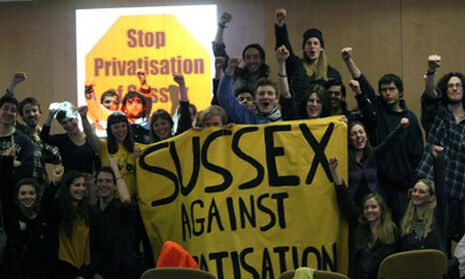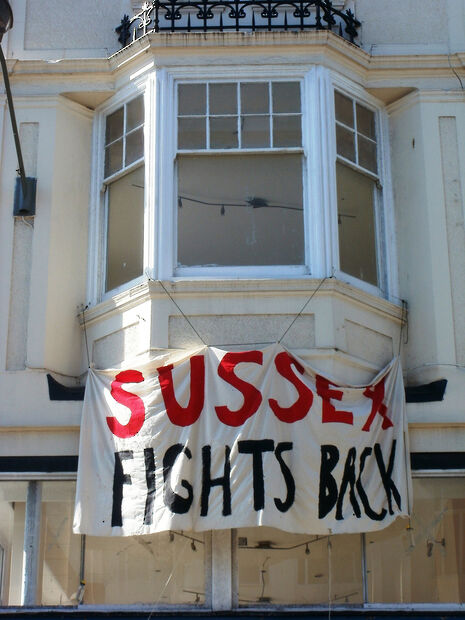Stalemate at Sussex as occupation continues into fourth week
Protestors at Sussex University show no sign of leaving the university building they have occupied for one month, demonstrating against plans to outsource jobs

The occupation of buildings at the University of Sussex has entered its fourth week, with no end in sight for the protests. The student action started on Thursday 7 February, when 43 students occupied Bramber House, a conference centre, in protest against the university’s decision to outsource non-academic staff jobs.
Students tried to occupy two lecture halls last Thursday, when students and academic staff celebrated the third week of the occupation with a demonstration, shouting, “Management, get out. We know what you’re all about. Cuts, job losses, money for the bosses.”
Although forced to leave the lecture halls, the Bramber House occupation is ongoing. The movement has been endorsed by many public figures including writer and journalist Will Self, comedians Mark Steel, Josie Long and Chris Coltrane, and Green MP Caroline Lucas who have all made appearances at the occupation.
The university has a history of protest. Students occupied a university building for ten days when tuition fees were introduced, and they joined other university students by campaigning against the tripling of tuition fees in 2011.

The occupation this time is in response to the unexpected announcement in May last year to transfer 235 campus staff jobs – including catering, cleaning, security, transport and porter positions – to a commercial provider.
Upset that the Student Union was not consulted on this decision, the protestors attempted to establish a dialogue with the management until they felt negotiation had become futile.
Michael, one of the occupiers, told Varsity that they are campaigning to “preserve the communities that exist on the campus”. He claimed that the proposed changes would probably entail the loss of pension rights and the possibility of future changes to working conditions.
The Sussex Against Privatisation movement has received support from across the university. On 1 March, 27 of the university’s academic staff co-authored a statement of solidarity with the students which they published in the Guardian. Professor Luke Martell, a lecturer in political sociology, is one of the 27. Martell told Varsity: “The protest has attracted a lot of students who weren’t previously involved in student politics or activism. A lot of academic staff support it, but they are scared to participate in the occupation.”
Students and staff alike have shown their support for the campaign by wearing yellow badges or sticking pieces of yellow paper in their windows. “There are yellow bits of paper all over the place”, Martell said.
Over the last two weeks these yellow badges themselves have become a source of dispute. University staff were asked to remove their badges which feature the campaign logo ‘support the 235’ and ‘1/235’ before staff meetings could begin. One the 235 members of staff to be replaced, Mr French, was ordered by the head of Human Resources to remove his email address signature, an image of the yellow badge.
As with many of the student protestors, Professor Martell believes that their cause is also a national one. “There is outsourcing at UCL, Sheffield and SOAS. Right now there are on-going government consultations to discuss whether private companies can formally call themselves universities. More and more of them are for profit organisations. This is about the general privatisation of British education.”
Asked about the atmosphereinside the occupied conference centre during the four week demonstration, Michael said: “We’re all working together. There’s no leader and there are no political factions. The role of the chair is rotated so that no one does it more than once, and decisions are made in open meetings. The atmosphere is incredible.” He added, “We have reclaimed a space in our university. The conference centre is usually off-limits. But now we’re putting on our own events.”
Michael described the events the occupiers plan to hold in the days ahead: “We’ve created a culture of open dialogue with panels on political subjects like privatisation, the future of the arts, capitalism in the 21stcentury and neoliberalism. We’ve got a film presentation on tuition fees from Professor Martin McQuillan, an academic and film-maker. But we’ve also got interesting and important talks from PhD students. There’s one tomorrow on the Middle Eastern roots of capitalism, and another on the Arab Spring. We’ve got a panel called ‘A New Strategic Plan’, in which we’re going to try and come up with strategies for the future of the university, from funding the arts to where we source our food. The academic staff have paid for a photo exhibition we’ve set up showing all the great work that the 235 do for us. The staff are wonderful.”

In addition, Michael confirmed that the renowned political activist and MIT linguist Noam Chomsky would deliver a lecture directly to the occupation via Skype. “Yes, that’s right. We also invited the Vice Chancellor to come and share the stage with him. It’s the kind of invitation you send out when you expect the answer to be no.”
Despite the presence of so many high-profile guests, Michael insists that the student occupiers are not just there for the social aspect and the talks, but believe in the occupation’s aims as well. “I think there’s a combination of the two. But what we have found is that the events make people feel passionate about the campaign. I haven’t met anybody who’s gone away from the event without believing in our cause. People leave changed, moved and pushed to get involved.”
Varsity contacted the Sussex University management for their views on the occupation but they declined to comment. Some protestors have been flooding the university’s phone lines and email inboxes with complaints in order to impede administration.
The management has, however, made its case against the occupiers in an open letter to the members of university staff who have complained about the outsourcing. The Vice Chancellor explained that he offered the occupiers a meeting on 12 February but that they declined. Michael said this offer was rejected by the occupiers, as “they offered us a 45 minute meeting and demanded that we would all have to evacuate the occupation. Given that they couldn’t guarantee we would be let back in, we decided on balance not to go to a meeting where they would just chew their pencils and pretend to listen. We sent one student anyway, and none of the management turned up. They had no intention of actually going. We’ve since offered to meet them in the occupation or on neutral ground. Their offer of a meeting was just a pathetic attempt to get some good PR.”

In the Vice Chancellor’s letter, they also highlighted the fact that Sussex was losing revenue from the occupation of the conference centre and suggested such losses may have to be overcome by cutting budgets. “In relation to the costs incurred, aside from the Students’ Union, the only other place where loss of revenue can be replaced would be from our teaching and research funds.” The protestors responded: “We think they should take it from the Vice Chancellor’s six figure salary.”
While the occupation appears to be stable for the moment, with some academic staff cautiously behind it, students are currently in a stalemate with privately-contracted security guards. The guards, accompanied by dog units, are surrounding the occupation at Bramber House and are imposing a lock-down between 10pm and 8am. The occupiers appear to have no intention of leaving however, and look set to remain in to the university holidays.
The students remain confident their occupation will produce results. “Don’t underestimate what we can achieve”, said Michael. “When we took over the building wedidn’t know what to expect. And now we’ve had coverage from the Guardian, the Independent, and papers from across the world. One of our lecturers told us the other day: when you’re pushed into a corner and told to be quiet, the best thing you can do is make lots ofnoise.”
 News / Eight Cambridge researchers awarded €17m in ERC research grants27 December 2025
News / Eight Cambridge researchers awarded €17m in ERC research grants27 December 2025 News / Clare Hall spent over £500k opposing busway 24 December 2025
News / Clare Hall spent over £500k opposing busway 24 December 2025 Comment / League tables do more harm than good26 December 2025
Comment / League tables do more harm than good26 December 2025 Comment / The ‘class’ of Cambridge24 December 2025
Comment / The ‘class’ of Cambridge24 December 2025 News / Caius mourns its tree-mendous loss23 December 2025
News / Caius mourns its tree-mendous loss23 December 2025









